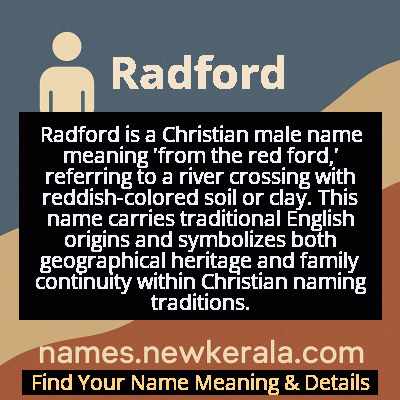Radford Name Meaning & Details
Origin, Popularity, Numerology Analysis & Name Meaning of Radford
Discover the origin, meaning, and cultural significance of the name RADFORD. Delve into its historical roots and explore the lasting impact it has had on communities and traditions.
Name
Radford
Gender
Male
Origin
Christian
Lucky Number
3
Meaning of the Name - Radford
Radford is a Christian male name meaning 'from the red ford,' referring to a river crossing with reddish-colored soil or clay. This name carries traditional English origins and symbolizes both geographical heritage and family continuity within Christian naming traditions.
Radford - Complete Numerology Analysis
Your Numerology Number
Based on Pythagorean Numerology System
Ruling Planet
Jupiter
Positive Nature
Optimistic, inspirational, and creative.
Negative Traits
Scattered, exaggerating.
Lucky Colours
Yellow, gold, purple.
Lucky Days
Thursday.
Lucky Stones
Yellow sapphire.
Harmony Numbers
1, 2, 9.
Best Suited Professions
Arts, writing, communication.
What People Like About You
Creativity, optimism.
Famous People Named Radford
Radford Bascome
Bermudian politician
Former Premier of Bermuda and prominent political leader
Radford Bobocel
Academic researcher
Notable contributions to organizational psychology and justice research
Radford de Silva
Sri Lankan cricketer
Professional cricketer who represented Sri Lanka in domestic competitions
Name Variations & International Equivalents
Click on blue names to explore their detailed meanings. Gray names with will be available soon.
Cultural & Historical Significance
Throughout British history, various towns and villages named Radford emerged across England, particularly in Nottinghamshire, Warwickshire, and Devon, creating multiple distinct family lines that eventually spread to North America and other English-speaking regions during colonial expansion. The name represents the English tradition of geographical identification and the Christian practice of maintaining family heritage through naming conventions. As English settlers brought the name to new continents, it became part of the cultural tapestry of countries like the United States, Canada, and Australia, where it continues to signify English ancestry and Christian family traditions.
Extended Personality Analysis
Individuals named Radford are often perceived as grounded, practical, and reliable, reflecting the name's earthy origins connected to land and river crossings. They tend to exhibit strong leadership qualities combined with a methodical approach to problem-solving, making them effective in positions requiring both vision and attention to detail. The historical connection to fords—places of transition and crossing—suggests personalities comfortable with guiding others through challenging transitions or mediating between different perspectives.
Radfords typically demonstrate loyalty to family and tradition while maintaining adaptability to changing circumstances. Their practical nature is often balanced by deep emotional intelligence, allowing them to form meaningful connections while maintaining the stability and reliability that the name's origins imply. The 'red' element in the name's meaning may also suggest a passionate, warm-hearted nature beneath their composed exterior, with a strong sense of justice and fairness. These individuals often become the steady foundation in their families and communities, providing guidance and support during times of change while honoring the traditions and values that give their lives meaning and purpose.
Modern Usage & Popularity
In contemporary times, Radford remains an uncommon but distinguished given name, primarily used in English-speaking countries with strong British heritage connections. It maintains a classic, traditional feel while avoiding being overly common, appealing to parents seeking unique yet established names. The name has experienced modest but steady usage, particularly in the United States and United Kingdom, where it's often chosen by families with historical ties to Radford lineages or those appreciating its strong, geographical origins. While not appearing on most popular baby name lists, it maintains a consistent presence, often selected by parents valuing traditional English names with clear meaning and historical depth. Its usage as both first name and surname continues, with recent trends showing slight increases in its adoption as a first name among families preferring substantive, heritage-rich names over more fashionable contemporary choices.
Symbolic & Spiritual Meanings
Symbolically, Radford represents transition, stability, and connection to the earth. The 'ford' element symbolizes crossing points—both literal river crossings and metaphorical transitions in life—suggesting an ability to navigate challenges and help others through difficult passages. The 'red' component carries multiple symbolic meanings: it can represent the life-giving quality of iron-rich soil, the warmth of human connection, or the vitality and passion that runs through family lineages. Together, these elements create a powerful symbolism of grounded leadership, where practical wisdom (the ford) combines with passionate purpose (the red earth). The name evokes images of reliable foundations, ancestral connections to specific places, and the enduring quality of family traditions passed through generations while adapting to new circumstances. In Christian context, it can symbolize the journey of faith and the earthly foundations upon which spiritual lives are built.

